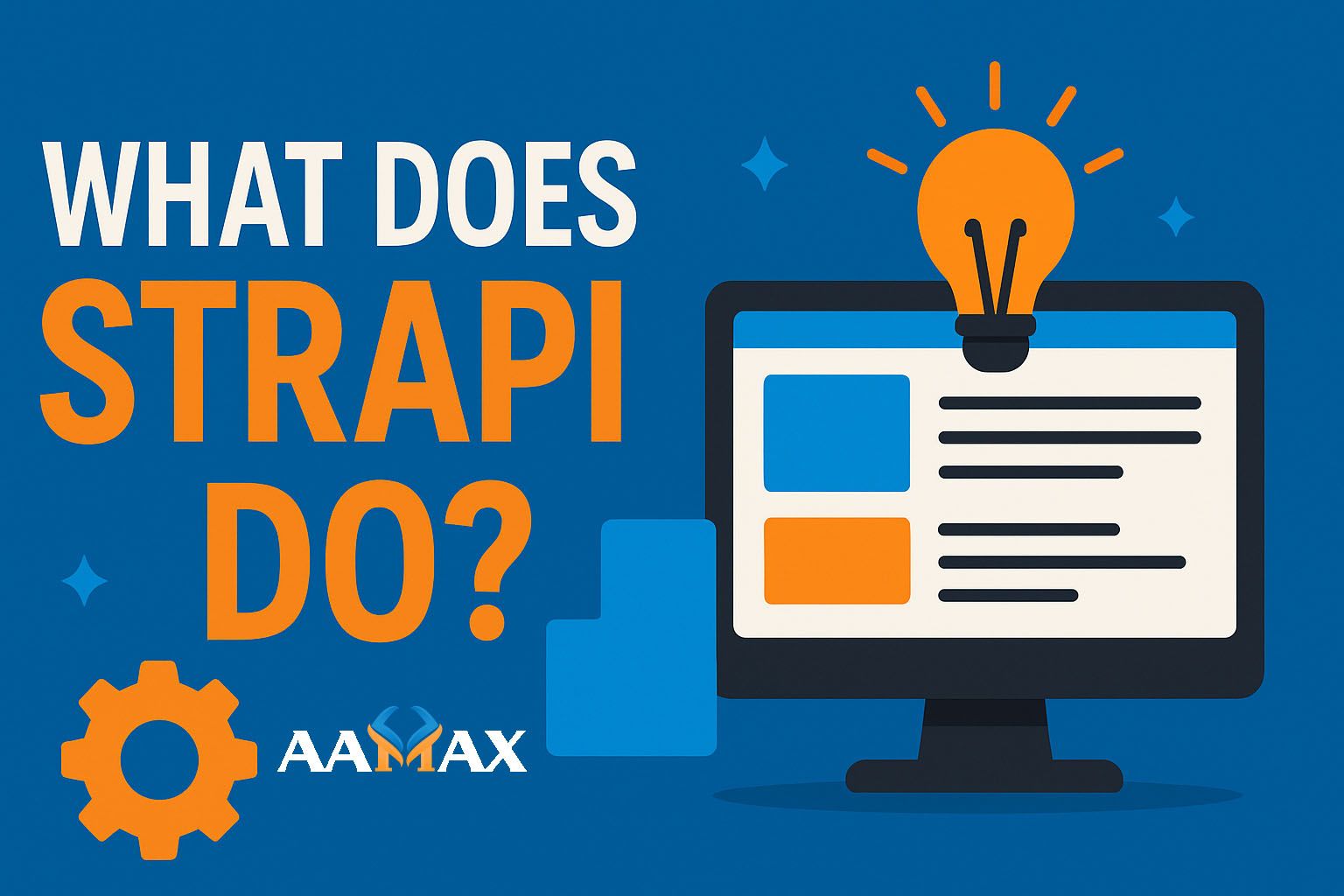
What Does Strapi Do
Strapi has rapidly become one of the most popular headless Content Management Systems (CMS) in the web development world. Developers, startups, and enterprises choose it because of its flexibility, extensibility, and ability to integrate seamlessly with modern JavaScript frameworks. Whether you are building websites, mobile applications, or digital experience platforms, Strapi provides a powerful content infrastructure that gives full control over your backend.
This in‑depth guide explores what Strapi does, why it matters, how it compares to other systems, how businesses use it, and why hiring experts such as AAMAX can elevate your Strapi and MERN Stack development projects to enterprise‑grade quality.
What is Strapi?
Strapi is an open‑source Headless CMS built with Node.js. It enables developers to create an API‑driven backend where content is stored and managed independently from the frontend. Unlike traditional CMS platforms that tightly couple the user interface with the backend, Strapi allows content distribution across multiple platforms: websites, mobile apps, IoT devices, kiosks, and more.
Why "Headless"?
In a headless architecture, the "head" (frontend) is removed, leaving the backend to function purely as a content API. This approach gives developers maximum control over how and where content appears.
Strapi accomplishes this by generating RESTful and GraphQL APIs automatically while giving administrators a clean and intuitive dashboard to manage content.
Key Features: What Exactly Does Strapi Do?
Strapi offers a large set of features that support modern development workflows. Here's what makes it special:
1. Strapi Manages Content Using a Flexible Admin Dashboard
Strapi provides a user‑friendly admin panel where content creators can manage content types, entries, assets, and permissions. Its drag‑and‑drop builder simplifies backend creation without requiring deep technical knowledge.
Content managers love Strapi because they can:
- Create and edit content easily
- Manage media---images, videos, PDFs
- Collaborate through user roles
- Preview and publish content instantly
- Localize content in multiple languages
This makes Strapi ideal for marketing teams, editorial workflows, and businesses that frequently update content.
2. Strapi Automatically Generates APIs
One of Strapi's most powerful capabilities is automatic API generation. When developers create content types, Strapi builds REST and GraphQL APIs instantly.
This means developers don't need to manually write backend routes for:
- Fetching content
- Adding new entries
- Managing permissions
- Filtering and searching
- Connecting external services
This saves substantial development time and ensures consistent API structure across projects.
3. Strapi Integrates Perfectly With Frontend Frameworks
Strapi connects smoothly with almost all modern frontend frameworks. This flexibility makes it ideal for multi‑platform content delivery.
You can integrate Strapi with:
- React
- Next.js
- Vue.js
- Nuxt.js
- Angular
- Svelte
- Gatsby
- Flutter
- iOS / Android Apps
This separation of concerns allows frontend teams and backend developers to work independently while delivering consistent content everywhere.
4. Strapi Gives Full Customization and Extensibility
Unlike many SaaS headless CMS solutions, Strapi is self‑hosted and fully customizable. Developers can:
- Modify the backend code
- Extend controllers
- Add custom plugins
- Integrate third‑party tools
- Write custom middleware
- Customize API responses
This high level of control makes Strapi suitable for enterprise‑level applications that require customized workflows.
5. Strapi Provides Enterprise‑Grade User Permissions
Strapi includes a Role‑Based Access Control (RBAC) system. This ensures the right people have the right level of access.
You can set permissions for:
- Admins
- Editors
- Authors
- Guests
- API Consumers
This feature is especially useful for large organizations with multiple teams working simultaneously.
6. Strapi Offers A Powerful Plugin Ecosystem
Strapi includes a plugin system that allows developers to enhance functionality. Some popular plugins include:
- GraphQL
- Documentation Generator
- SEO Tools
- Email Integration
- User Permissions
- Audit Logs
- Internationalization (i18n)
- Cloudinary Integration
Plugins make it easy to extend Strapi without reinventing the wheel.
7. Strapi Supports Multi‑Language Content (i18n)
Businesses operating globally rely heavily on localization. Strapi's built‑in Internationalization plugin allows content teams to manage multiple languages effortlessly.
You can manage:
- Multi‑regional content
- SEO adjustments
- Localization workflows
This makes Strapi a strong choice for brands targeting global markets.
What Problems Does Strapi Solve?
Strapi solves several major challenges faced in traditional CMS systems and modern development environments.
1. Eliminates Backend Development Complexity
Creating a backend from scratch is time‑consuming. Strapi eliminates repetitive tasks like building CRUD operations, authentication, and content structures.
2. Enables Consistent Content Across Multiple Platforms
Strapi allows businesses to deliver content to:
- Websites
- Mobile apps
- Digital kiosks
- Smart devices
- Wearables
The API‑first approach ensures consistency no matter where content is displayed.
3. Improves Developer Productivity
With automatic APIs, role management, and plugin support, developers can focus on core features instead of backend boilerplate.
4. Provides Control Compared to SaaS CMS Tools
Unlike tools like Contentful or Sanity, Strapi can be hosted anywhere:
- AWS
- DigitalOcean
- Heroku
- Azure
- Dedicated servers
- VPS solutions
This provides:
- Full ownership of data
- No vendor lock‑in
- Lower long‑term costs
How Businesses Use Strapi
Strapi's flexibility makes it suitable for many use cases.
1. Corporate Websites
Strapi helps build scalable corporate websites where teams can manage content easily.
2. E‑Commerce Platforms
Pairing Strapi with frontend frameworks like Next.js creates blazing‑fast e-commerce sites.
3. Mobile App Backends
Strapi APIs can power content for Android and iOS apps.
4. SaaS Applications
Companies use Strapi to manage dashboards, user data, and modular content.
5. Multi‑Brand or Multi‑Region Platforms
Global companies use Strapi to centralize content across multiple product lines and countries.
6. Marketing Landing Pages
Marketing teams use Strapi to build landing pages without involving developers.
Strapi vs Other Headless CMS Platforms
Strapi vs WordPress (Headless)
WordPress can be used as headless, but:
- Strapi is faster
- More secure
- Easier to customize
- Built natively for modern JavaScript stacks
Strapi vs Contentful
Contentful is SaaS-based. While powerful, it is costly and cannot be fully customized.
Strapi offers:
- Complete code access
- No usage limits
- Full control over hosting
Strapi vs Sanity
Sanity offers a studio approach, but Strapi provides a more intuitive UI and simplified API structure.
Why Strapi Works Perfectly With the MERN Stack
The MERN Stack---MongoDB, Express.js, React, and Node.js---is one of the most popular JavaScript stacks.
Strapi works seamlessly with MERN because:
- It is built on Node.js
- Uses JavaScript across backend and frontend
- Connects naturally with MongoDB
- Provides APIs React apps can consume easily
For businesses building modern web platforms, the Strapi + MERN combination is ideal.
Why Hire AAMAX for Strapi & MERN Stack Development?
AAMAX is a full‑service digital marketing and development agency offering:
- MERN Stack Development
- Strapi Backend Development
- Custom API Development
- Web Development
- Digital Marketing
- SEO Services
By hiring experts, businesses gain:
- Faster development timelines
- Robust customizations
- Optimized database structures
- Secure role‑based permissions
- Clean frontend integrations
- Scalable hosting setups
AAMAX's development team delivers enterprise‑grade Strapi solutions that empower businesses to manage their content efficiently while achieving high performance across all digital platforms.
Final Thoughts
Strapi is far more than just a CMS. It is a complete content infrastructure built for the modern web---secure, scalable, flexible, and fully customizable. Whether you are launching a startup, developing a global website, building a mobile app, or scaling digital operations, Strapi makes backend development smarter and faster.
Businesses looking to maximize the power of Strapi should work with experienced teams who understand both backend and frontend ecosystems deeply. This ensures clean architecture, optimized data structures, and seamless integration with modern frameworks.
If you're planning to adopt Strapi for your website, mobile app, or digital platform, hiring a professional team like AAMAX ensures a smooth and successful development journey.







